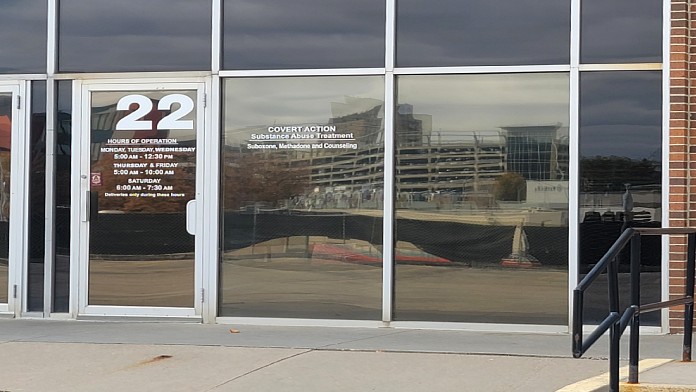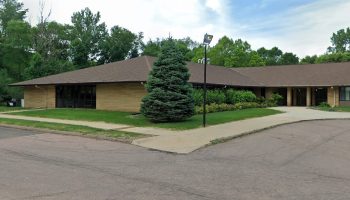Covert Action Treatment Facility

About Covert Action Treatment Facility
Covert Action Treatment Facility is an opioid recovery center for adults. It’s based in Des Moines, Iowa. Their team understands the mental, physical, and emotional toll addiction can take on guests and loved ones, and they are experienced in recovery solutions.
The modern facility is near public transportation, offering more accessibility for commuting. It’s open on weekdays and Saturday mornings.
Easing Withdrawal Symptoms
One reason some guests fear seeking addiction recovery is because of the withdrawal process. Cover Action understands this hesitance and includes medication-assisted treatment (MAT) to ease these symptoms and reduce cravings so guests can focus on recovery without getting distracted and uncomfortable. But please note that while MAT is available, the staff does not treat chronic pain that may be associated with cravings.
Along with medication, the team incorporates behavior therapy to address the potential underlying causes of substance use. There may be past traumas that contributed to addiction issues, and therapy can reveal those and help guests work through them for lasting sobriety.
Personalized Approach
The staff understands that a generic approach to recovery won’t work for every person. They believe your care plan should be unique and meet your specific needs and goals. The team doesn’t focus on addiction symptoms, but instead on complete healing.
The center partners with community resources to provide wraparound care that follows you after treatment. This service can connect guests with safe housing, employment, and legal assistance.
The outpatient program allows guests the time to visit nearby attractions that promote healing, such as Pappajohn Sculpture Park, offering tranquil natural spaces and walking trails, surrounded by artwork.
They work with numerous health insurance companies, including Blue Cross Blue Shield, Medicare, and Molina Healthcare.
| Levels of Care | Detox Service Setting | Programs | Payment Options |
|---|---|---|---|
|
Inpatient and residential programs provide round-the-clock medical and emotional support as you live at the treatment facility. This level of care may be recommended if you have severe addictions or mental health conditions since it removes outside distractions and allows you to focus solely on therapy. |
In outpatient therapy, you’ll attend therapy sessions several times each week while living at home. This is ideal if you have a strong support system and a lower risk of relapse. Outpatient treatment offers flexibility to maintain work, school or family obligations. |
||
|
Inpatient detox occurs in a dedicated treatment facility. You’ll live there around the clock and receive intensive medical support and supervision to help manage your withdrawal symptoms. It is suitable for individuals with moderate to severe addictions as it ensures a stable detox environment. |
Outpatient detox gives you access to medically supervised withdrawal services while still allowing you to live at home. You’ll attend a clinic for treatment and monitoring. This flexible option is suitable for those with mild to moderate withdrawal symptoms who have strong support systems. |
||
|
Alcohol detox programs offer medical support to help individuals withdraw safely from alcohol. Your care team may use medications to ease your symptoms and provide medical monitoring to address complications. |
Drug detox programs support individuals who are withdrawing from addictive substances like cocaine and heroin. Medical support helps you manage symptoms in a controlled and safe environment so you can achieve initial sobriety. |
||
|
Private Insurance
|
Self Pay
|
Levels of Care
Inpatient and residential programs provide round-the-clock medical and emotional support as you live at the treatment facility. This level of care may be recommended if you have severe addictions or mental health conditions since it removes outside distractions and allows you to focus solely on therapy.
In outpatient therapy, you’ll attend therapy sessions several times each week while living at home. This is ideal if you have a strong support system and a lower risk of relapse. Outpatient treatment offers flexibility to maintain work, school or family obligations.
Detox Service Setting
Inpatient detox occurs in a dedicated treatment facility. You’ll live there around the clock and receive intensive medical support and supervision to help manage your withdrawal symptoms. It is suitable for individuals with moderate to severe addictions as it ensures a stable detox environment.
Outpatient detox gives you access to medically supervised withdrawal services while still allowing you to live at home. You’ll attend a clinic for treatment and monitoring. This flexible option is suitable for those with mild to moderate withdrawal symptoms who have strong support systems.
Programs
Alcohol detox programs offer medical support to help individuals withdraw safely from alcohol. Your care team may use medications to ease your symptoms and provide medical monitoring to address complications.
Drug detox programs support individuals who are withdrawing from addictive substances like cocaine and heroin. Medical support helps you manage symptoms in a controlled and safe environment so you can achieve initial sobriety.
Contact

Patti Croft has content writing experience in several areas, including health and fitness, cybersecurity, and animal care. She is passionate about mental health and addiction treatment and strives to share information that is enjoyable and accessible. She loves reading, consuming too much coffee, and spending time with her friends and pets.

Peter W.Y. Lee is a historian with a focus in American Cold War culture. He has examined how popular culture has served as a coping mechanism for the challenges and changes impacting American society throughout the twentieth century.




